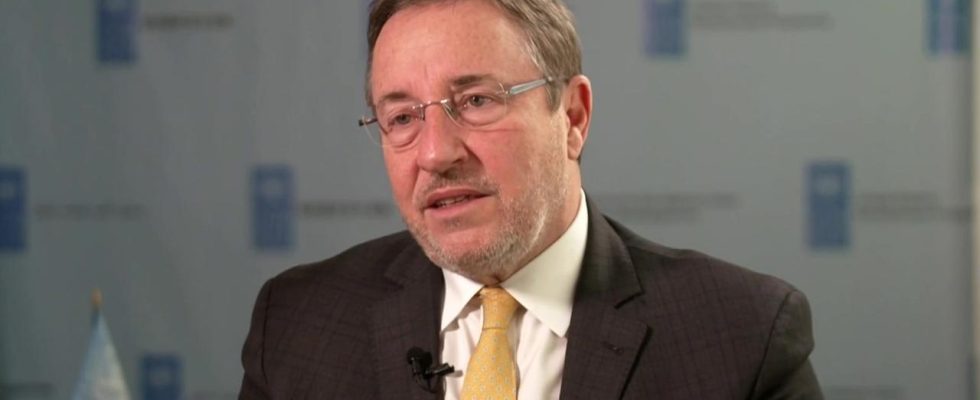interview
For the first time, more than half of the world’s population supports politicians and parties that disregard democratic rules. The UN development agency UNDP warns of this development. Your boss Achim Steiner says: “The world is drifting apart.”
ARD: With its report every year, the United Nations keeps the thermometer on the state of the world, i.e. health, education, living standards, but also social trends. This year the report goes even deeper. It has the challenging title: “Breaking the stalemate. Rethinking cooperation in a polarized world.” Why this signal?
Achim Steiner: Well, because in many ways today, when we look at the big risks, there are a lot of red lights. The world is drifting apart at the moment. Geopolitical tensions, more conflicts, more refugees, economic crises – development is currently suffering from this disruption in many parts of the world.
For the first time in two decades, the world is diverging in terms of economic development. And related to that: we haven’t experienced such political polarization, drifting apart, populism, radicalization in the world for a long time. Democracy is something that basically everyone wants for themselves.
But in almost 50 percent of countries, people elect parties and political leaderships that partially dismantle democracy. This is a very dangerous and also a very worrying moment. That is why this human development report is also an attempt to understand: what is happening to us right now, in our countries and as an international community?
“Suddenly our neighbor is our enemy”
ARD: What is happening then? Where does division and the trend towards hostility to democracy begin?
Steiner: I think two terms are very quickly recognizable to everyone. We live in a time in which many things no longer work as we might have expected. Uncertainty and fear shape the perception of many people around the world today, whether in developed or developing countries. This uncertainty about the future creates the conditions for fear to suddenly become a kind of political poison in our political discourse. Suddenly our neighbor is the enemy. The threat comes from outside and a lot of what happens with populism in our democracy is: you turn inward and you defend yourself outward.
In many countries today we see that people support democracy. Who doesn’t want to choose their politicians? But increasingly people are voting for politicians and political parties that undermine precisely this democracy. And we have to address that now. On the one hand, it is an illusion to be able to only reflect on oneself in the 21st century. We live in a world that is interdependent. Our own future is just as dependent on what is happening politically and economically in our own country as it is in a country that is making decisions perhaps 5,000 kilometers away.
To person
Achim Steiner is head of the UN development program UNDP. From 2006 to 2014 he was head of the UN environmental program UNEP.
Whether it is the next pandemic, whether it is climate change, whether it is digitalization and also the risks that come with digitalization, for example, with artificial intelligence. Cyber warfare, crime in cyberspace – these are all things that we as countries cannot deal with alone and in isolation.
And yet populism is leading us in exactly that direction. That’s why the report says: The major risks of our time are not always and usually reduced to whether one country attacks another, but rather we must look at the future with a broader understanding of security. That also means working together even if you don’t necessarily always agree. And above all, we have to ensure that populism does not ultimately take away our ability to work with others.
“The discussion starts in every single country”
ARD: How can this succeed, even in view of the current major crises and conflicts? Does the report also suggest solutions?
Steiner: On the one hand, we have to start in our own countries, I would almost say: at the kitchen table, in the living room, in schools, in public discussions. Because there is a lot of disinformation being introduced into the political discussion at the moment. Enemy images, fear, fear – these are all ways to turn people against each other. And I think sometimes the truth and the information lose a lot of freedom in this moment. Therefore: The discussion about what we want, must and can do internationally ultimately begins in each individual country. That’s one thing.
The second is: We also need to be able to invest more in each other. This may seem surprising at first. But climate change, the transition to renewable energies, infrastructure, even preparation for the next pandemic – richer countries can initially support the poorer countries. You can invest with us. And that’s not just development aid, it’s also investing in what the report highlights very strongly, namely the global goods that we all share with each other in the world, but which are currently in great danger.
“Germany has gained ground”
ARD: How does Germany rank among the 193 countries and territories covered by the human development report?
Steiner: Germany is one of the richest countries in the world. Germany was the third largest economy in the world last year. It is therefore not surprising that Germany is very well in the top ten. (Editor’s note: Germany is in 7th place).
What is perhaps also interesting is that Germany has managed to increasingly decouple its economic growth from negative environmental impacts, especially through consistent energy and environmental policies. Compared to many other countries, Germany has gained ground here and this UNDP report is certainly an incentive that Germany can continue to play a leading role for itself, but also for the international community.
The interview was conducted by Antje Passenheim, ARD New York. The conversation has been adapted for the written version.

